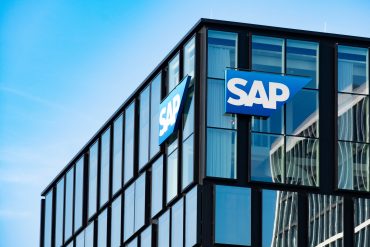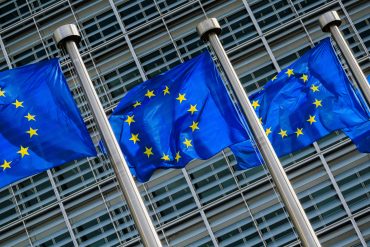
- Antitrust
- Enterprise Software
- EU Regulation
SAP Faces EU Antitrust Probe Over ERP Software Practices
6 minute read

European regulators investigate SAP’s ERP software practices amid claims of market dominance and restrictive maintenance policies
Key Takeaways
- SAP stock drops 2.5% as the European Commission launches antitrust investigation into the software giant’s alleged monopolistic practices in ERP maintenance services
- Potential fines up to €3 billion representing 10% of SAP’s annual global revenue of over €30 billion if found guilty of anticompetitive behavior
- Third-party service providers blocked from competing in SAP’s lucrative ERP aftermarket through restrictive licensing and mandatory maintenance contracts
Introduction
Europe’s largest software maker faces its biggest regulatory challenge as the European Commission opens a formal antitrust investigation into SAP’s dominant ERP market position. The probe centers on allegations that SAP has systematically blocked third-party competitors from providing maintenance and support services to European businesses.
SAP SE stock fell on Thursday following the announcement, reflecting investor concerns about potential financial penalties and forced changes to the company’s profitable service model. The investigation threatens a core revenue stream for SAP, as maintenance contracts generate steady income from thousands of European enterprises that rely on the company’s business management software.
Key Developments
The European Commission’s investigation focuses on SAP’s alleged abuse of its dominant position in the Enterprise Resource Planning software market. Regulators examine whether the company has erected artificial barriers that prevent rival service providers from competing effectively in the aftermarket for maintenance and support services.
European Commission Vice President Teresa Ribera states the core concern: “Thousands of companies across Europe use SAP’s software to run their business, as well as its related maintenance and support services. We are concerned that SAP may have restricted competition in this crucial aftermarket, by making it harder for rivals to compete, leaving European customers with fewer choices and higher costs.”
The probe targets specific practices including SAP’s alleged requirement that customers use only its own maintenance services for on-premises ERP software. Additionally, regulators scrutinize the company’s licensing complexity and restrictions that prevent customers from terminating unused licenses, effectively locking clients into long-term contracts.

Market Impact
The investigation represents more than a regulatory hurdle for SAP, as maintenance and support services constitute a significant portion of revenue for enterprise software companies. The ERP market serves as SAP’s stronghold, providing essential business functions to European enterprises and generating substantial recurring revenue through service subscriptions.
According to Investing.com, the stock decline reflects broader market concerns about mounting legal and compliance costs. SAP recently paid $220 million in fines and settlements in the US for unrelated bribery charges, demonstrating escalating regulatory pressures across multiple jurisdictions.
The investigation occurs as Oracle overtakes SAP in ERP revenue during 2024, highlighting the shifting competitive landscape and risks for incumbents who struggle to adapt quickly to changing market demands.
Strategic Insights
SAP’s defensive response includes offering concessions to address EU concerns, including improved interoperability and simplified licensing structures. The company seeks to avert harsher penalties while maintaining its profitable service model, but faces pressure to transition toward more flexible and transparent sales tactics.
The broader implications extend beyond SAP to the entire enterprise software sector. Regulatory agility becomes critical for vendors as the EU pushes to lower switching costs, enable data portability, and foster competition in cloud services. These changes particularly impact legacy software providers with established customer bases and recurring revenue models.
SAP’s $20 billion investment in sovereign cloud infrastructure to meet EU data sovereignty demands now faces additional scrutiny. Regulators examine how these investments align with fair competitive practices, particularly regarding the company’s RISE with SAP model that bundles ERP systems with cloud services.

Expert Opinions and Data
SAP acknowledges the investigation while maintaining its compliance position. “We acknowledge the investigation and are committed to demonstrating our compliance with EU regulations,” an SAP spokesperson states, indicating the company’s willingness to engage with regulators.
The financial stakes remain substantial, with potential fines reaching 10% of SAP’s annual global sales. For a company generating over €30 billion in annual revenue, penalties could exceed €3 billion, representing a significant financial impact beyond the immediate stock decline.
Market analysts suggest the investigation underscores broader regulatory trends affecting enterprise software providers. The EU Data Act implementation in 2025 reinforces requirements for greater interoperability and data portability, forcing companies to redesign traditional licensing models.
Conclusion
The European Commission’s antitrust probe represents a pivotal moment for SAP and the broader enterprise software industry. The investigation challenges fundamental aspects of how dominant software providers structure their service offerings and maintain customer relationships.
SAP faces the immediate challenge of balancing regulatory compliance with business model preservation while competitors gain potential advantages in the evolving market landscape. The case establishes precedents that will likely influence future enterprise software licensing practices and competitive dynamics across Europe and beyond.








